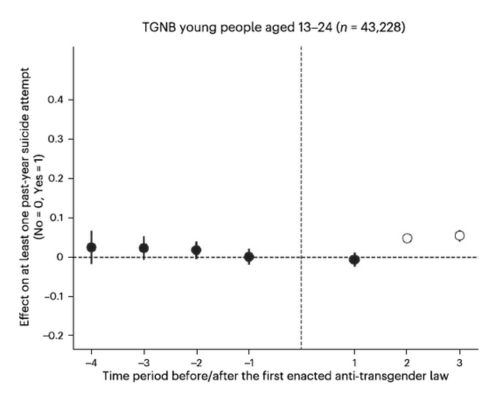Anti-Transgender Laws and Youth Suicide
States with anti-transgender laws saw a 38-44% increase in youth suicide attempts in the year following the enactment of the law.

Read Time: 2 minutes
Published:
If you Google “anti-trans laws,” hundreds of news articles report on bills being proposed and passed across the U.S. Such articles highlight bills targeting bathroom access, transgender women in women’s sports, health care restrictions, and more. In 2024 alone, 533 anti-transgender bills were introduced, 49 of which became law. The wave of new laws responds to the growing recognition and support for trans and non-binary rights. Many of these bills raise concerns about mental health, as this population already faces higher risks of depression, anxiety, and suicidal ideation.
One alarming consequence of these laws is their link to increased suicide attempts among transgender youth. To quantify this link, Wilson Y. Lee and colleagues examined the effects of anti-transgender state laws enacted between 2018 and 2022 on suicide attempts among transgender and non-binary youth, ages 13 to 24.

Between 2018 and 2022, 19 state governments enacted 48 anti-transgender laws. Researchers assessed the impact of each state’s first anti-trans law on the reported occurrence of young people who attempted suicide at least once in the previous year. The dotted vertical line in the figure indicates the point of a state’s first enacted anti-trans law.
Suicide attempts did not immediately increase after a law was enacted (time period 1), but they increased in subsequent time periods, rising by 25% and 27% above the sample average. Overall, states with restrictive laws witnessed a 38-44% increase in suicide attempts in the year following the enactment of a law. Younger individuals (ages 13-17) experienced the most severe impact, with up to a 72% increase in attempts. Younger people often have less access to LGBTQ+-affirming resources and support.
Currently, 26 states have enacted anti-trans laws affecting 40% of transgender youth. As more states implement laws that specifically target transgender youth, researchers urge state legislators to recognize gender-affirming care, resources, and facilities as essential lifesaving measures and to enhance, through law, the mental health protection of this vulnerable population.



